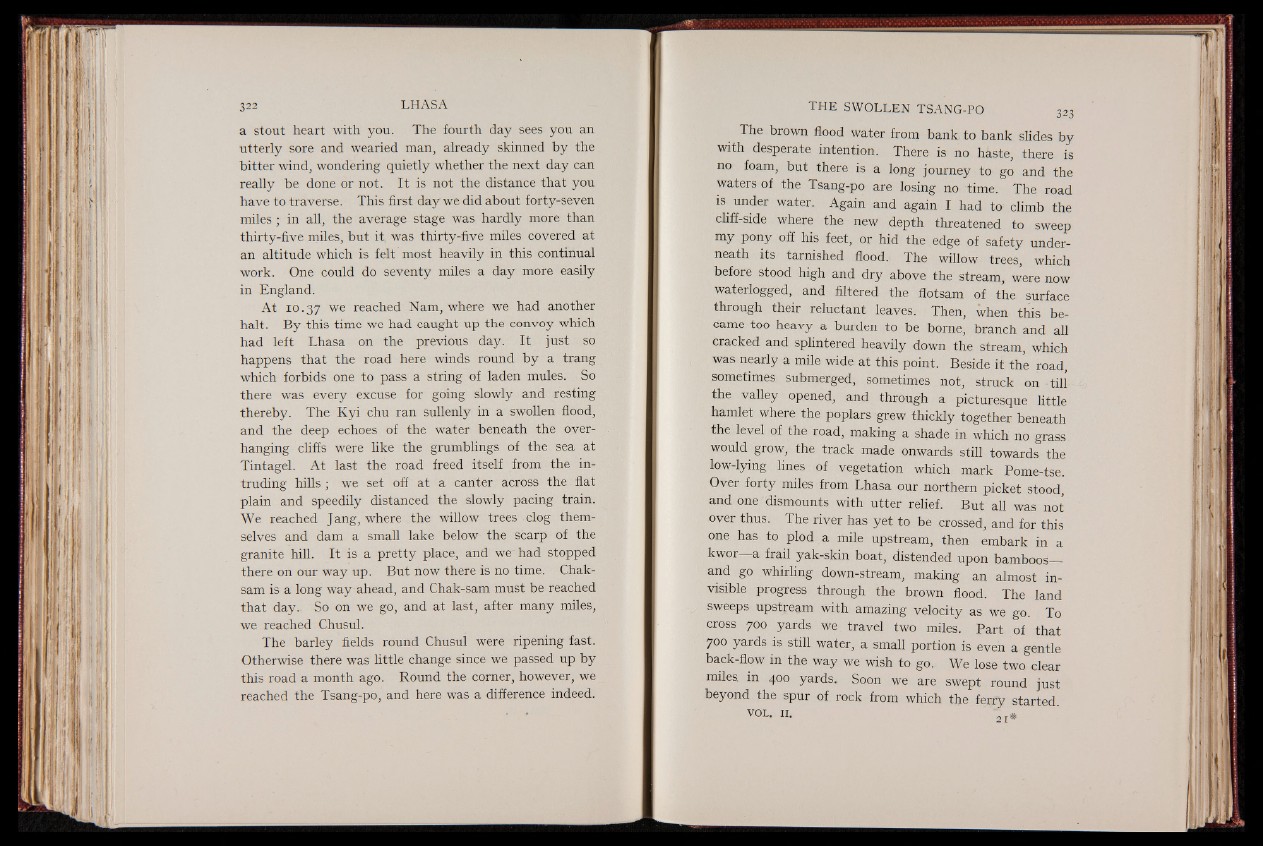
a stout heart with you. The fourth day sees you an
utterly sore and wearied man, already skinned by the
bitter wind, wondering quietly whether the next day can
really be done or not. It is not the distance that you
have to traverse. This first day we did about forty-seven
miles I in all, the average stage was hardly more than
thirty-five miles, but it was thirty-five miles covered at
an altitude which is felt most heavily in this continual
work. One could do seventy miles a day more easily
in England.
At 10.37 we reached Nam, where we had another
halt. B y this time we had caught up the convoy which
had left Lhasa on the previous day. It just so
happens that the road here winds round by a trang
which forbids one to pass a string of laden mules. So
there was every excuse for going slowly and resting
thereby. The K yi chu ran sullenly in a swollen flood,
and the deep echoes of the water beneath the overhanging
cliffs were like the grumblings of the sea at
Tintagel. At last the road freed itself from the intruding
hills ; we set off at a canter across the flat
plain and speedily distanced the slowly pacing train.
We reached Jang, where the willow trees clog themselves
and dam a small lake below the scarp of the
granite hill. It is a pretty place, and we had stopped
there on our way up. But now there is no time. Chak-
sam is a long way ahead, and Chak-sam must be reached
that day. So on we go, and at last, after many miles,
we reached Chusul.
The barley fields round Chusul were ripening fast.
Otherwise there was little change since we passed up by
this road a month ago. Round the corner, however, we
reached the Tsang-po, and here was a difference indeed.
The brown flood water from bank, to bank slides by
with desperate intention. There is no haste, there is
no foam, but there is a long journey to go and the
waters of the Tsang-po are losing no time. The road
is under water. Again and again I had to climb the
cliff-side where the new depth threatened to sweep
my pony off his feet, or hid the edge of safety underneath
its tarnished flood. The willow trees, which
before stood high and dry above the stream, were now
waterlogged, and filtered the flotsam of the surface
through their reluctant leaves. Then, when this became
too heavy a burden to be borne, branch and all
cracked and splintered heavily down the stream, which
was nearly a mile wide at this point. Beside it the road,
sometimes submerged, sometimes not, struck on till
the valley opened, and through a picturesque little
hamlet where the poplars grew thickly together beneath
the level of the road, making a shade in which no grass
would grow, the track made onwards still towards the
low-lymg lines of vegetation which mark Pome-tse.
Over forty miles from Lhasa our northern picket stood,
and one dismounts with utter relief. But all was not
over thus. The river has yet to be crossed, and for this
one has to plod a mile upstream, then embark in a
kwor a frail yak-skin boat, distended upon bamboos_
and go whirling down-stream, making an almost invisible
progress through the brown flood. The land
sweeps upstream with amazing velocity as we go. To
cross 700 yards we travel two miles. Part of that
700 yards is still water, a small portion is even a gentle
back-flow in the way we wish to go. We lose two clear
miles in 400 yards. Soon we are swept round just
beyond the spur of rock from which the ferry started.
v o l . 11. “2I#